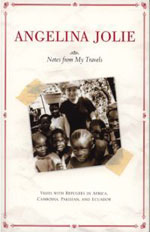 You may be surprised by the author I am about to recommend: Angelina Jolie. Yes, that Angelina, the Hollywood wild-child. Lately she’s been getting some attention because of her role as Goodwill Ambassador for the United Nations High Commissioner on Refugees. I’ve been aware of that for some time. Her movie “Beyond Borders,” with Clive Owen co-starring, involved UNHCR work in Ethiopia, Cambodia, and Chechnya. The DVD extras, spotlighting refugee crises in the world, were illuminating.
You may be surprised by the author I am about to recommend: Angelina Jolie. Yes, that Angelina, the Hollywood wild-child. Lately she’s been getting some attention because of her role as Goodwill Ambassador for the United Nations High Commissioner on Refugees. I’ve been aware of that for some time. Her movie “Beyond Borders,” with Clive Owen co-starring, involved UNHCR work in Ethiopia, Cambodia, and Chechnya. The DVD extras, spotlighting refugee crises in the world, were illuminating.
Then I read her 2003 book, Notes from My Travels. It’s wonderful–just observations, journal-style, from travels to Africa, Cambodia, Pakistan, and Ecuador. She travels without an entourage–just herself, meeting up with UN people, and often finding herself in potentially dangerous places. Her eye for meaningful detail is impressive. She doesn’t take potshots at America, as you expect celebrities to do. She doesn’t pontificate, doesn’t act like an expert. She just writes what she sees, and with great humility and compassion. And it’s fascinating.
 In the book’s third paragraph, as she prepares for her first foreign visit–to Sierra Leone, in West Africa–she writes:
In the book’s third paragraph, as she prepares for her first foreign visit–to Sierra Leone, in West Africa–she writes:
“I honestly want to help. I don’t believe I am different from other people. I think we all want justice and equality. We all want a chance for a life with meaning. All of us would like to believe that if we were in a bad situation, someone would help us….I don’t know why I think I can make any kind of difference. All I know is that I want to.”
I was skeptical initially. But she won me over with this passage from a stopover in the Ivory Coast, while en route to Sierra Leone. She is standing in a marketplace, watching people.
“Contrary to our image of this country, it’s people are civilized, strong, proud, stunning people. Any aggressive feeling is pure survival. There is no time for casual or lazy behavior.
“As I wrote that, I realized I am writing as if I am studying people in a zoo.
“I feel stupid and arrogant to think I know anything about these people and their struggles.”
I think of church people I’ve heard, returning from a two-week trip to build a church in Honduras or Jamaica, talking as if they are now experts on that country and have the people thoroughly psycho-analyzed. Jolie avoids any such pretense throughout the book.
Here are some other excerpts.
- After noting that many of the children in one African refugee camp have scabies: “I would rather get infected than to ever think about pulling my hands away from these little children.”
- “I can’t imagine what a mother or father or even a husband or wife feels when the people they love most in the world are suffering, and there is nothing they can do. When a mother can’t feed a child. When a father can’t provide for his family. When a husband can’t protect his wife.”
- While starting her second trip, this one to Cambodia: “I am embarrassed to realize (and to admit) how much I was able to return to my life after Africa….It’s easy to make phone calls and send letters and funds from the comfort and safety of your own home. Maybe I think I should feel guilty for my ability to come and go from these places when others have no choice. I know one thing. I know I appreciate everything more. I am so grateful for my life.”
- In Cambodia: “We drive beside horse-drawn carts. The horses seem little and skinny. It makes me wonder if animal-rights activists would be upset–probably just sad. It’s strange how sometimes it seems some people care more for their animals than the poor family next door.”
- In Pakistan, commenting on women wearing full-body burkas. “No one can make eye contact with each other. Children cannot see their mother’s expressions. No individuality–no self–and it is very hot. I bought one and tried it on. I felt like I was in a cage. They are horrible.”
- In Pakistan: “Some people complain and say UNHCR should do more to help the refugees. This is hard for the staff to hear. These people simply don’t understand the limited funds and cutbacks. As one staff member said, ‘People can complain about us around the world, and governments can criticize our programs. But every day we continue to come face-to-face with hungry, sick people who feel it is up to us to help them.”
She tells the heart-breaking stories of dozens of refugees, with detail that you only pick up when you’re listening intently. Stories of dedicated UN workers, stories of refugee camps. Her observations from Cambodia’s “Genocide Museum” were gut-wrenching.
The book also reminded me of the importance of the United Nations. In the US, right-wing pundits continually say the UN is worthless, that the US should get out. Yes, the UN is seriously flawed and idiotic things happen (just as idiotic things happen in the US Congress). But the UNHCR works in 120 countries, serving 20 million people who are invisible to the rest of the world, people who depend on the UN (including US dollars) for survival. Would God be pleased if America pulled out of the UN, and left so many dispossessed people without any advocates?
Anyway, it’s quite a book. Angelina Jolie doesn’t pretend to be a Christian, but the type of stuff she does, and her spirit amidst it, certainly shows the attitude a Christian should have. And then we just have to figure out the other side, the Hollywood marriage-busting vixen. People often have two sides, I guess, including us church-goers. I just know that I’d gladly hear her speak, but wouldn’t walk across the street to hear Sean Penn or Michael Moore.
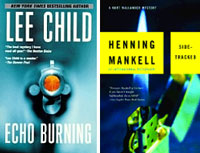 I can’t say they keep getting better, because the third book in the series, The White Lioness, was my favorite thus far. But this ranks second, and kept me captivated. The novels are set in Sweden (Mankell is Swedish, and the books are translated from Swedish). I love the way national boundaries mean little, and are easily crossed, in Europe.
I can’t say they keep getting better, because the third book in the series, The White Lioness, was my favorite thus far. But this ranks second, and kept me captivated. The novels are set in Sweden (Mankell is Swedish, and the books are translated from Swedish). I love the way national boundaries mean little, and are easily crossed, in Europe.

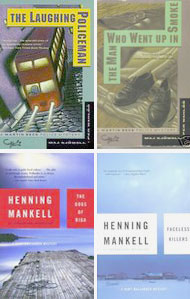 I’ve read books by two different Swedish authors. Three books by Henning Mankell, whose protagonist is police detective Kurt Wallander. And two books by Maj Sjorrel about detective Martin Beck. Mankell is the better and more prolific writer. His book White Lioness, in particular, was amazing, with two different investigations, and two sets of fully-developed characters, occurring simultaneously in different countries (Sweden and South Africa). It was a fascinating read, watching the two investigations intersect. But I like Martin Beck a lot, too.
I’ve read books by two different Swedish authors. Three books by Henning Mankell, whose protagonist is police detective Kurt Wallander. And two books by Maj Sjorrel about detective Martin Beck. Mankell is the better and more prolific writer. His book White Lioness, in particular, was amazing, with two different investigations, and two sets of fully-developed characters, occurring simultaneously in different countries (Sweden and South Africa). It was a fascinating read, watching the two investigations intersect. But I like Martin Beck a lot, too.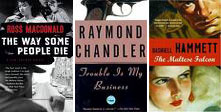 I love the old-time, private detective pulp novels, and so I’m going to bore you with amateur drivel about the most famous ones. Please don’t humor me. Just go away and come back tomorrow, unless you envision the possibility of appreciating my shallow insights. I shall seek to sound officious, but don’t be fooled.
I love the old-time, private detective pulp novels, and so I’m going to bore you with amateur drivel about the most famous ones. Please don’t humor me. Just go away and come back tomorrow, unless you envision the possibility of appreciating my shallow insights. I shall seek to sound officious, but don’t be fooled.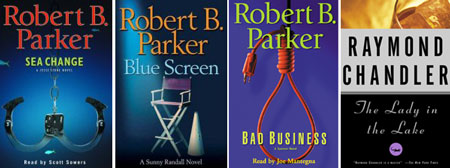
 Here are three good novels I’ve read in the last year. All are somewhat similar in that the protagonist becomes a murderer.
Here are three good novels I’ve read in the last year. All are somewhat similar in that the protagonist becomes a murderer.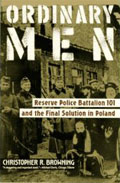 I read Elie Weisel’s Night as part of a literature class in 11th grade, and ever since, I’ve been drawn to Holocaust literature. It’s not fun stuff to read. It’s pretty horrifying. What draws me? Probably the question which thunders to the forefront with each book: “How could people do this?”
I read Elie Weisel’s Night as part of a literature class in 11th grade, and ever since, I’ve been drawn to Holocaust literature. It’s not fun stuff to read. It’s pretty horrifying. What draws me? Probably the question which thunders to the forefront with each book: “How could people do this?” You may be surprised by the author I am about to recommend: Angelina Jolie. Yes, that Angelina, the Hollywood wild-child. Lately she’s been getting some attention because of her role as Goodwill Ambassador for the United Nations High Commissioner on Refugees. I’ve been aware of that for some time. Her movie “Beyond Borders,” with Clive Owen co-starring, involved UNHCR work in Ethiopia, Cambodia, and Chechnya. The DVD extras, spotlighting refugee crises in the world, were illuminating.
You may be surprised by the author I am about to recommend: Angelina Jolie. Yes, that Angelina, the Hollywood wild-child. Lately she’s been getting some attention because of her role as Goodwill Ambassador for the United Nations High Commissioner on Refugees. I’ve been aware of that for some time. Her movie “Beyond Borders,” with Clive Owen co-starring, involved UNHCR work in Ethiopia, Cambodia, and Chechnya. The DVD extras, spotlighting refugee crises in the world, were illuminating. In the book’s third paragraph, as she prepares for her first foreign visit–to Sierra Leone, in West Africa–she writes:
In the book’s third paragraph, as she prepares for her first foreign visit–to Sierra Leone, in West Africa–she writes:


